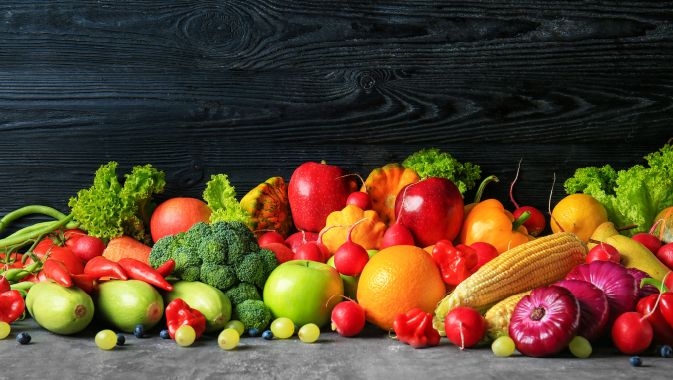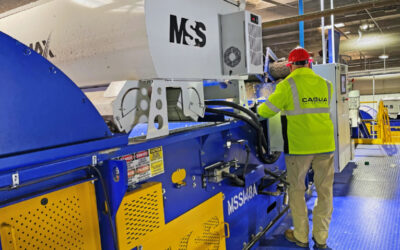From sweeping the floors of a loading dock to owning his own multimillion dollar company, Nick Delgado knows what it means to build a successful business from the ground up. One of the most important parts of his achievement? His family.
Any way you look at it, Quality Fruit & Vegetable Company is a success. Located in El Paso, Texas, the produce distributor has been business for more than 40 years, employing 170 people and serving a large part of the southwestern U.S. and northern Mexico.
The company has a well-rounded and diversified customer base, including independent and chain restaurants, small local fruit stands, and large grocery chains, and continues to see a steady growth in its profits. There’s good money in quality lettuce and cucumbers.
There is also a dramatic story behind how the company came to be. Ask Nick Delgado, owner and founder of the Quality Fruit & Vegetable Company, and he will tell you about the challenges he had to overcome and what he learned along the way. “I like to share the story that the American dream is still here,” he says. “It is not as easy as when I started, but you can still do it today.”
When he was 12, Delgado was being raised by his mother in El Paso and was introduced to the produce distribution business through his two uncles, Alfred and Manny. “I started by sweeping floors and unloading trucks. Most customers were from Mexico and didn’t know English and I couldn’t speak Spanish. I ended up picking up Spanish on the job,” Delgado says.
This was also at the time before loading docks were commonly used so that meant when the truck pulled into the warehouse the bags would have to be unloaded and then moved into a central location for distributing. “I was lifting 100-pound potato sacks from the truck and moving them to the pile on the dock. I was just 98 pounds and a sack of potatoes was 100 pounds.”
Delgado eventually became a driver for his uncles, making deliveries to Fort Bliss and other locations, learning more about the business by observing the competition and how things were done.
El Paso is a city firmly rooted in Texas but also part of a larger population that straddles the U.S.–Mexican border. The cultural influence here is definitely a blend of Southwestern American and Mexican. It is also an important hub for international trade between the two countries. And of course, people love their food!
As a distributer of produce, there is a large population to cater to and many companies would try to focus on one market segment in particular, whether it was American or Mexican. Delgado’s uncles’ company focused on selling produce almost exclusively to Mexico; in fact, nearly 90 percent of the business was in the Mexican market. While it was a market that was well known to the uncles, it made the business vulnerable to sudden changes in value to the Mexican peso.
One case that stands out in Delgado’s mind was the sharp devaluation of the peso when he graduated high school. “It was like a recession in El Paso, with many businesses that relied on the Mexican market suffering as a result. Our business fell to the ground,” he shares.
Even at a young age, Delgado recognized that being so concentrated in a single market increased the financial risks for the business. Not afraid to share his opinion, he spoke to his uncle Alfred about trying to do more business in American markets. While his uncle was not interested in exploring other markets himself, he gave Delgado free rein to help grow the business.
Delgado saw that it wasn’t enough to try to expand into different markets; they also had to give customers what they wanted, namely additional produce options.
“We basically grew into a full line,” he explains. “One of the tricky items we added was bananas. They don’t ripen well on their own; they have to be processed and you need to add water for moisture as well as heat.” Delgado didn’t take an advanced course on how to manage bananas, he simply did what kept making him successful – watching and learning from others in the business, then applying those lessons himself.
Adapting to customer preferences is in many ways at the heart of the produce distribution business, where finding the balance between supply and demand is a daily battle. At any point a distributor can end up with less of a particular fruit or vegetable than expected, or the market may suddenly become saturated with a certain fruit and the price will suddenly drop. It’s at these points that you have to be willing to go with your gut and experience to make real-time decisions – after all, the produce will simply not stay fresh while you are trying to do a cost-benefit analysis.
It is even more difficult to try to start a business on your own in such a challenging sector, but that is what Delgado would go on to do. He worked for his uncles for 20 years, building up the customer base and managing the operations during his final six years when his uncle Alfred retired. For family-owned businesses, a lot of changes take place when a founder takes a step back or retires, and the situation can be even more challenging when there is no succession plan in place to help the transition.
A recent survey by the National Bureau of Economic Research Family Business Alliance in 2016 found that 43 percent of family-owned businesses do not have a succession plan in place. This is significant because it can often take as much as 10 years to successfully transition a business to a new generation of owners. It is also at this point when the family behind the business can end up having disagreements about the future and even escalate these into legal matters.
By now Delgado was 33 and had two children. He felt that with all the changes that were taking place at his uncles’ business, it was the time to start a wholesale produce company of his own. This was a big change – from being part of a business to the owner of one. He talked to his wife about what it could mean and how much more work there could be.
“She was very supportive and said that, ‘you’ve got to do what you’ve got to do,’” Delgado says. He told his uncles that he was opening his own business. It was one of the hardest things he had to do, but he had confidence that he knew the local market. What he had to do was secure the suppliers he needed so that he could attract customers.
For produce distributers, getting up at midnight to get fruit and vegetables from suppliers is part of the job, but finding the right suppliers to provide good quality produce and the variety that customers are looking for is a constant challenge, and the competition is fierce. This was one of the first big obstacles for Delgado to overcome as he was told that one of the main suppliers in the El Paso area would not sell to him because of the conflict with his uncles’ business.
What made the difference for Delgado were all the happy customers he had accumulated after working in the business for two decades. “I got a great response from my customers of 20 years,” he shares. “They were very comfortable with me so my business took off fast.” And by having a good base, he could establish connections with the right suppliers, including that large supplier that did not sell to him when he started out.
The other important event was that his uncle Manny, who managed the trucks at the family business, came to join Delgado as a partner, bringing five of his trucks as well as capital to help establish the business. That was in 1986 and from there Quality Fruit & Vegetables continued to grow into a business that now covers West Texas, New Mexico and Northern Mexico.
Even though he is the owner of a multimillion dollar company, Delgado has not lost sight of what matters. He makes a point to donate what he can to shelters to help feed the hungry. “I remember what it is to be poor and not have enough to eat,” he says.
As for Delgado’s other uncle who had retired, uncle Alfred, he also joined Quality Fruit & Vegetables. And the two of them would regularly have coffee and talk about the industry. As Delgado puts it, “I really wanted him to be on my side because there is nothing bigger than family.”













